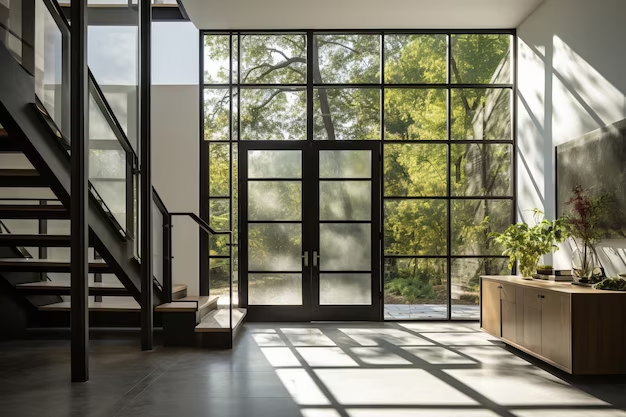
In today’s modern office design, maximizing natural light has become a key consideration for architects and designers. The use of glass partition walls has emerged as a popular solution to harness the power of daylight, creating bright, open, and inviting interior spaces. By integrating glass office walls, businesses can optimize the benefits of natural light, promoting a healthier and more productive work environment.
Glass partition walls offer a unique advantage in daylight integration. They allow the flow of natural light to penetrate deep into the interior, reducing the dependence on artificial lighting during the day. This not only saves energy but also creates a visually dynamic space that connects occupants with the outdoors. Studies have shown that exposure to natural light improves mood, enhances concentration, and increases overall well-being. By strategically placing glass partitions in office spaces, businesses can create a seamless transition between indoor and outdoor environments, fostering a sense of harmony and tranquility.
The science behind daylight integration is centered around the concept of biophilic design. Biophilia refers to the innate human connection to nature, and incorporating elements of nature into the built environment has been proven to have numerous benefits. When it comes to glass partition walls, the goal is to create an environment that mimics the outdoors, with abundant natural light and views of the surrounding landscape. This integration of nature not only enhances the aesthetic appeal of the space but also improves air quality and promotes a sense of well-being among employees.
To maximize daylight integration, architects and designers must carefully consider the orientation and placement of glass partition walls. South-facing walls are ideal for capturing the most sunlight throughout the day, while east-facing walls can provide a gentle morning glow. Additionally, the use of reflective surfaces and light-colored furnishings can help bounce and amplify natural light, further enhancing its impact within the space. By thoughtfully incorporating glass partition walls into the overall design, businesses can create an interior environment that is both visually stunning and functionally efficient.
Light and Shadow Play: Creating Visual Interest with Glass Partitions and Natural Light
Natural light has the power to transform an interior space, creating a dynamic interplay of light and shadow. Glass partition walls offer a unique opportunity to harness this play of light, adding visual interest and depth to an office environment. By strategically positioning glass walls and incorporating design elements that interact with natural light, businesses can create an engaging and inspiring workspace.
One of the key design principles when working with glass partition walls is to consider the angle and direction of sunlight throughout the day. By studying the path of the sun, designers can determine the areas that will receive the most direct light and those that will be cast in shadow. This knowledge allows for the placement of glass walls in areas that will maximize the play of light and shadow, creating a visually captivating environment.
To further enhance the visual interest, designers can incorporate architectural elements that interact with natural light. This can include features such as textured glass, patterned screens, or even strategically placed artwork that casts unique shadows. By playing with transparency and opacity, designers can create a sense of depth and dimension within the space, making it more visually stimulating for occupants.
In addition to the aesthetic benefits, the interplay of light and shadow created by glass partition walls can also have a positive impact on productivity and creativity. Studies have shown that exposure to dynamic lighting conditions can stimulate the brain and improve cognitive performance. By creating an environment that stimulates the senses through the use of natural light and shadow play, businesses can foster a more inspired and innovative workforce.
Wellness through Lighting: The Positive Effects of Sun Exposure Enabled by Glass Walls
The connection between natural light and human health and wellness is well-documented. Sunlight is a vital source of vitamin D, which plays a crucial role in our overall well-being. By incorporating glass walls into office spaces, businesses can provide employees with increased access to natural light, promoting better health and well-being.
Exposure to sunlight has been shown to improve mood and reduce the risk of depression. By allowing natural light to flow through glass partition walls, businesses can create a brighter and more uplifting environment that boosts employee morale. Natural light also helps regulate the body’s internal clock, known as the circadian rhythm. This helps to maintain a healthy sleep-wake cycle and improve overall sleep quality, leading to increased productivity and alertness during the day.
In addition to the psychological benefits, natural light also has a positive impact on physical health. Sunlight is a natural source of vitamin D, which is essential for bone health and immune function. By incorporating glass walls into office design, businesses can ensure that employees receive adequate exposure to sunlight, reducing the risk of vitamin D deficiency and related health issues.
To optimize the wellness benefits of natural light, it is important to strike a balance between exposure and glare. While natural light is beneficial, excessive glare can be distracting and uncomfortable. By using high-quality glass and incorporating shading devices such as blinds or curtains, businesses can control the amount of light entering the space, ensuring a comfortable and productive work environment.
Circadian Rhythms: Balancing Natural Light with Glass Partitions for Improved Health and Productivity
The human body is naturally attuned to the rhythms of the sun, and disruptions to our circadian rhythms can have a significant impact on health and productivity. Glass partition walls offer a unique opportunity to balance natural light and create an environment that supports the body’s natural sleep-wake cycle.
One of the key considerations when working with glass walls is to minimize the negative effects of excessive light exposure, particularly in the late afternoon and evening. While natural light is beneficial during the day, exposure to bright light in the evening can disrupt the body’s natural sleep patterns. To mitigate this, designers can incorporate shading devices or adjustable glass that can be tinted or dimmed during the later hours of the day.
Another important factor in balancing natural light is to consider the needs of individual workspaces. While some areas may benefit from direct sunlight, others may require more subdued lighting conditions for tasks that require focused concentration. By incorporating glass partition walls that offer varying levels of transparency, businesses can create a flexible and adaptable workspace that caters to the diverse needs of their employees.
By striking a balance between natural light and the demands of the modern work environment, businesses can create a space that promotes improved health and productivity. Glass partition walls offer the perfect solution, allowing for the integration of natural light while maintaining privacy and functionality. By harnessing the power of sunlight, businesses can create a workplace that is not only aesthetically pleasing but also conducive to employee well-being and performance.









